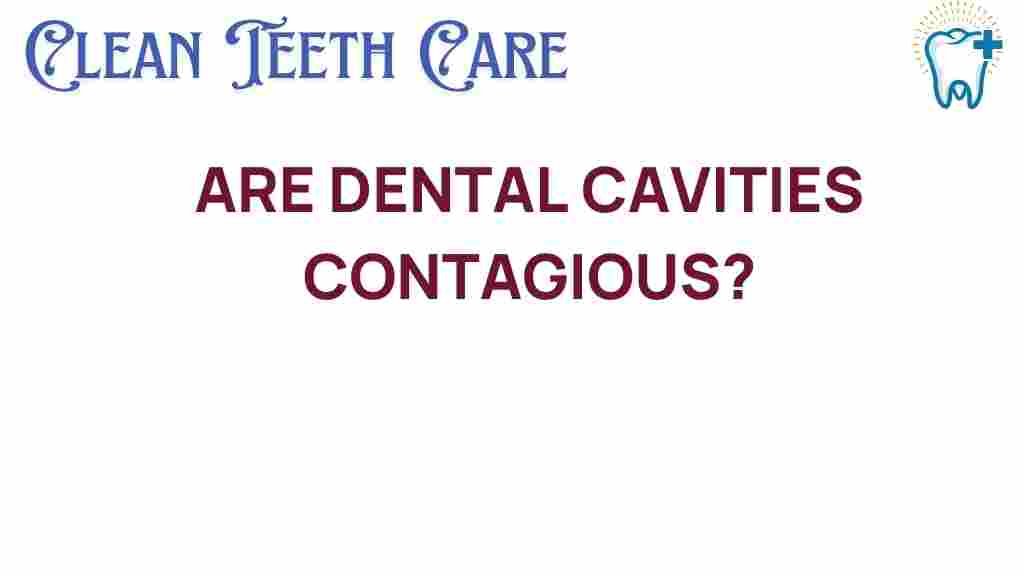Are Dental Cavities Contagious?
Dental cavities, also known as tooth decay, are one of the most common oral health issues affecting people of all ages. While many individuals associate cavities with poor dental hygiene or high sugar consumption, the question arises: are dental cavities contagious? This article will delve into the surprising truth about dental cavities, exploring the role of bacteria transmission, prevention strategies, and the importance of children’s dental care.
Understanding Dental Cavities
Before we address the contagion of dental cavities, it’s essential to understand what they are. Dental cavities occur when the hard surface of teeth, known as enamel, breaks down due to the action of bacteria. These bacteria produce acids that erode the enamel, leading to holes or cavities. The primary culprits behind tooth decay include:
- Streptococcus mutans: This bacterium is often found in the mouth and is a significant contributor to the formation of dental cavities.
- Other bacteria: A variety of other bacteria can also contribute to tooth decay, especially in the presence of sugars and starches.
Bacteria Transmission and Dental Cavities
The concept of contagious diseases usually refers to illnesses that can be spread from person to person through direct contact or respiratory droplets. However, when it comes to dental cavities, the situation is a bit different. While cavities themselves are not contagious in the traditional sense, the bacteria that cause tooth decay can be transmitted between individuals. Here’s how:
- Saliva Exchange: Bacteria can be transferred through saliva, which means sharing utensils, kissing, or even close contact can facilitate the spread of cavity-causing bacteria.
- Parental Influence: Parents can unknowingly pass on harmful bacteria to their children through habits like tasting their food or cleaning a pacifier with their mouth.
Therefore, while dental cavities are not contagious like a cold or flu, the bacteria responsible for cavities can be transmitted, increasing the risk of tooth decay in those who come into contact with them.
Factors Contributing to Tooth Decay
Several factors can influence the development of dental cavities, including:
- Poor Oral Hygiene: Inadequate brushing and flossing allow plaque to accumulate, increasing the risk of cavities.
- Dietary Choices: Frequent consumption of sugary and acidic foods can fuel the growth of cavity-causing bacteria.
- Fluoride Exposure: Lack of fluoride, a mineral that helps strengthen enamel, can lead to increased susceptibility to cavities.
- Dry Mouth: Reduced saliva flow can hinder the mouth’s ability to neutralize acids and wash away food particles.
Preventing Dental Cavities
Prevention is key when it comes to avoiding dental cavities. Here are some effective strategies to maintain optimal oral health and reduce the risk of tooth decay:
1. Maintain Good Dental Hygiene
Practicing good dental hygiene is crucial in preventing cavities. This includes:
- Brushing teeth at least twice a day with fluoride toothpaste.
- Flossing daily to remove food particles and plaque from between teeth.
- Using an antibacterial mouthwash to help reduce oral bacteria.
2. Regular Dental Visits
Regular check-ups with your dentist are vital for monitoring oral health and catching potential issues early. Dentists can:
- Conduct professional cleanings to remove plaque and tartar.
- Apply fluoride treatments to strengthen enamel.
- Identify early signs of cavities and recommend appropriate treatments.
3. Healthy Diet Choices
A balanced diet plays a significant role in oral health. Consider the following tips:
- Limit sugary snacks and beverages, especially between meals.
- Incorporate more fruits, vegetables, and whole grains into your diet.
- Drink plenty of water, particularly fluoridated water if available.
4. Sealants and Fluoride Treatments
Dental sealants can provide extra protection for children’s teeth. These are thin coatings applied to the chewing surfaces of back teeth, preventing food particles and bacteria from settling in the grooves. Fluoride treatments can also strengthen enamel and make teeth more resistant to decay.
5. Educating Children about Dental Hygiene
Children’s dental care is crucial in preventing cavities. Parents can help by:
- Teaching children proper brushing and flossing techniques.
- Encouraging healthy eating habits from a young age.
- Making dental visits a positive experience to reduce anxiety.
Troubleshooting Common Dental Issues
Even with the best preventive measures, some individuals may still encounter dental issues. Here are some troubleshooting tips:
Identifying Early Signs of Cavities
Early detection of cavities can help prevent further damage. Watch for these signs:
- Tooth sensitivity to hot, cold, or sweet foods.
- Visible holes or pits in the teeth.
- Discoloration of teeth (dark spots or stains).
What to Do if You Suspect Cavities
If you notice any signs of tooth decay, it’s essential to act quickly. Here’s a step-by-step process:
- Schedule a Dental Appointment: Contact your dentist for an examination as soon as possible.
- Maintain Oral Hygiene: Continue brushing and flossing to keep the area clean.
- Monitor Symptoms: Keep track of any changes in sensitivity or pain.
Addressing Dental Anxiety
For those who fear dental visits, consider the following tips to alleviate anxiety:
- Discuss your fears with your dentist; they can provide comfort and reassurance.
- Practice relaxation techniques such as deep breathing before your appointment.
- Bring a friend or family member for support.
Conclusion
In conclusion, while dental cavities themselves are not contagious, the bacteria that cause tooth decay can be transmitted through saliva. Understanding the role of bacteria transmission, coupled with strong prevention strategies, is essential for maintaining optimal oral health. By practicing good dental hygiene, making healthy dietary choices, and ensuring regular dental visits, you can significantly reduce your risk of developing dental cavities.
For more information on dental care and oral hygiene, check out this resource. Remember, taking proactive steps today can lead to a healthier smile tomorrow!
This article is in the category Conditions and created by CleanTeethCare Team
